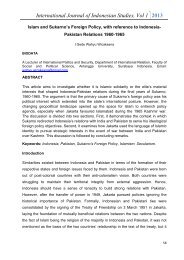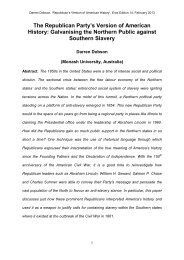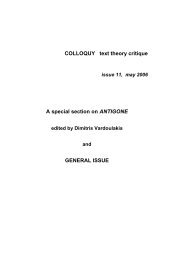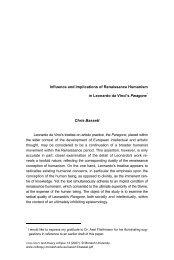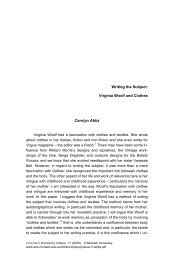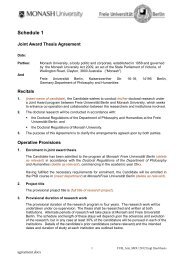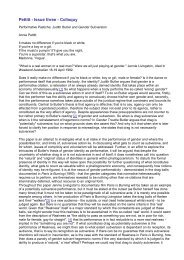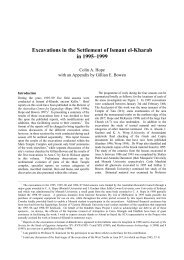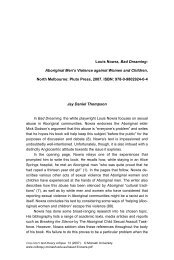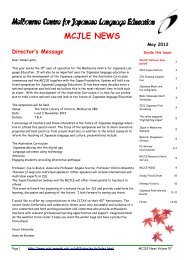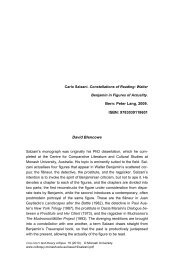░ <strong>The</strong> <strong>Acknowledgement</strong> <strong>of</strong> <strong>Love</strong> <strong>in</strong> <strong>Sarah</strong> Ruhl’s <strong>Drama</strong> 11<strong>The</strong> Two Doomed <strong>Love</strong>s <strong>of</strong> EurydiceIn October 2006, D<strong>in</strong>itia Smith wrote <strong>in</strong> <strong>The</strong> New York Times: “Jockeyshave the Triple Crown, hockey players have the three-goal hat trick, butthere is no equivalent <strong>in</strong> the theatre for what has been happen<strong>in</strong>g to <strong>Sarah</strong>Ruhl lately.” 17 Smith is referr<strong>in</strong>g to the well-timed open<strong>in</strong>g <strong>of</strong> <strong>The</strong> CleanHouse at New York’s L<strong>in</strong>coln Center, the success <strong>of</strong> Eurydice at the YaleRepertory <strong>The</strong>atre, and the announcement <strong>of</strong> Ruhl’s MacArthur award. Eurydicepremiered at the Berkeley Repertory <strong>The</strong>atre <strong>in</strong> 2004, ran at the YaleRep. <strong>in</strong> 2006, and then opened <strong>in</strong> New York <strong>in</strong> 2007. In his review <strong>of</strong> theYale Rep. production, described as “devastat<strong>in</strong>gly lovely—and just pla<strong>in</strong>devastat<strong>in</strong>g,” Charles Isherwood asserts, “Eurydice is ultimately about thepa<strong>in</strong>ful choice that comes with the pass<strong>in</strong>g <strong>of</strong> joys and pleasures: whetherto remember, <strong>in</strong> sadness, or to forget, and achieve a calm but emptier equilibrium.”18 Also at the core <strong>of</strong> this play, which Ruhl dedicated to her father,is the matter <strong>of</strong> how death and loss affect romantic love. <strong>The</strong> Clean Houseexam<strong>in</strong>es a k<strong>in</strong>d <strong>of</strong> non-romantic love capable <strong>of</strong> acknowledg<strong>in</strong>g mortality,but it stops short <strong>of</strong> <strong>in</strong>quir<strong>in</strong>g <strong>in</strong>to whether mortality is squarely <strong>in</strong>compatiblewith dreamy, Orphic love. To get at this issue, Ruhl turns to the myth <strong>of</strong> Eurydiceand Orpheus. Accord<strong>in</strong>g to the myth, soon after Eurydice and Orpheusare married, Eurydice is bitten by a snake and dies. Her griev<strong>in</strong>ghusband descends to the underworld to retrieve her. He is granted permissionto lead her back to earthly life so long as he does not turn to look ather as they climb to the upper world. Near the threshold, Orpheus steals aglance at his trail<strong>in</strong>g wife, and, just as quickly, Eurydice plunges back to theunderworld. And, alas, they are forever separated. 19Traditional accounts <strong>of</strong> the myth tend to emphasise Orpheus’s braveryand impatient desire. In Ovid’s Metamorphoses, for example, Orpheus’sboldness and gallantry are central: “Up the slop<strong>in</strong>g path, through the mutesilence they made their way, up the steep dark track, wrapped <strong>in</strong> impenetrablegloom, till they had almost reached the surface <strong>of</strong> the earth. Here,anxious <strong>in</strong> case his wife’s strength be fail<strong>in</strong>g and eager to see her, the loverlooked beh<strong>in</strong>d him, and straightway Eurydice slipped back <strong>in</strong>to thedepths.” 20 Ovid says little more about Eurydice than that she felt pa<strong>in</strong> <strong>in</strong> herheel from her fatal snake-bite as she waited for her husband to rescue her.<strong>The</strong> tendency to downplay Eurydice caught Ruhl’s attention: “I’d seen somany beautiful retell<strong>in</strong>gs from Cocteau to Black Orpheus, but rarely doesanyone look at Eurydice’s experience. I always found that troubl<strong>in</strong>g—she’sthe one who dies and takes a journey before Orpheus, but we don’t reallysee her experience.” 21 Ruhl notes one exception: Rilke’s poem “Orpheus.Eurydice. Hermes.” In this poem, Eurydice is described as “uncerta<strong>in</strong>, gentle,and without impatience” as she waits for Orpheus. 22 Death, surpris<strong>in</strong>gly,
12Thomas Butler░hasn’t been so bad for Eurydice:Be<strong>in</strong>g deadFilled her beyond fulfillment. Like a fruitSuffused with its own mystery and sweetness,She was filled with her vast death, which was so new,She could not understand that it had happened. 23In Ruhl’s play, Eurydice ga<strong>in</strong>s depth and complexity <strong>in</strong> her “vast death”through her encounter with her father who already resides <strong>in</strong> the underworld.<strong>The</strong> emotional core <strong>of</strong> this play centres on Eurydice’s choice: shouldshe go with Orpheus and lose her father, or should she stay with her fatherand lose Orpheus? In traditional accounts <strong>of</strong> the myth, there really is notmuch <strong>of</strong> a choice for Eurydice: <strong>of</strong> course, she should follow Orpheus. 24 ButRuhl casts a sceptical eye on Orpheus and Eurydice’s relationship. <strong>The</strong>play beg<strong>in</strong>s <strong>in</strong> a self-conscious, pseudo-mythic manner as it <strong>in</strong>troduces Orpheusand Eurydice when they are young, <strong>in</strong> love, and still <strong>in</strong> the land <strong>of</strong>the liv<strong>in</strong>g:Eurydice: All those birds? Thank you.He nods. <strong>The</strong>y make a quarter turn and he makes a sweep<strong>in</strong>g gesture,<strong>in</strong>dicat<strong>in</strong>g an <strong>in</strong>visible sea.And—the sea! For me? When?Orpheus opens his hands.Now? It’s m<strong>in</strong>e already?Orpheus nods.Wow. (CH, 333)Eurydice’s “Wow” tempers the seriousness <strong>of</strong> this mythic courtship, and, toa similar effect, Ruhl, <strong>in</strong> her “Notes,” <strong>in</strong>structs Eurydice and Orpheus to “resistthe temptation to be ‘classical’” (CH, 332). Nonetheless, despite thescene’s abundant lightness, this courtship is a legendary example <strong>of</strong> agreat love. As Ruhl presents it, Eurydice and Orpheus’s love is <strong>in</strong>nocentand marked by a desire to come together <strong>in</strong> a joyous, everlast<strong>in</strong>g union, thek<strong>in</strong>d Aristophanes imag<strong>in</strong>es <strong>in</strong> Plato’s Symposium. 25 This desire is clearestwhen Orpheus, the composer <strong>of</strong> “the most beautiful music <strong>in</strong> the world,”expla<strong>in</strong>s: “I’m go<strong>in</strong>g to make each strand <strong>of</strong> your hair <strong>in</strong>to an <strong>in</strong>strument.Your hair will stand on end as it plays my music and become a hair orches-



